Analyzing Academic Literacy Development: A Detailed Review
VerifiedAdded on 2023/04/26
|6
|1397
|317
Literature Review
AI Summary
This literature review synthesizes five articles concerning academic literacy development in higher education. The review covers topics such as study support systems, teaching academic writing, and the relationship between language proficiency and academic literacy. Methodologies employed in the reviewed articles include quantitative, qualitative, and mixed-methods approaches, with a focus on understanding the experiences and challenges faced by undergraduate and postgraduate students. The review highlights the importance of addressing issues like ideology, epistemology, and strategy in academic writing, and the need for institutions to support students in developing their academic literacy skills. Desklib provides access to similar solved assignments and past papers for students.
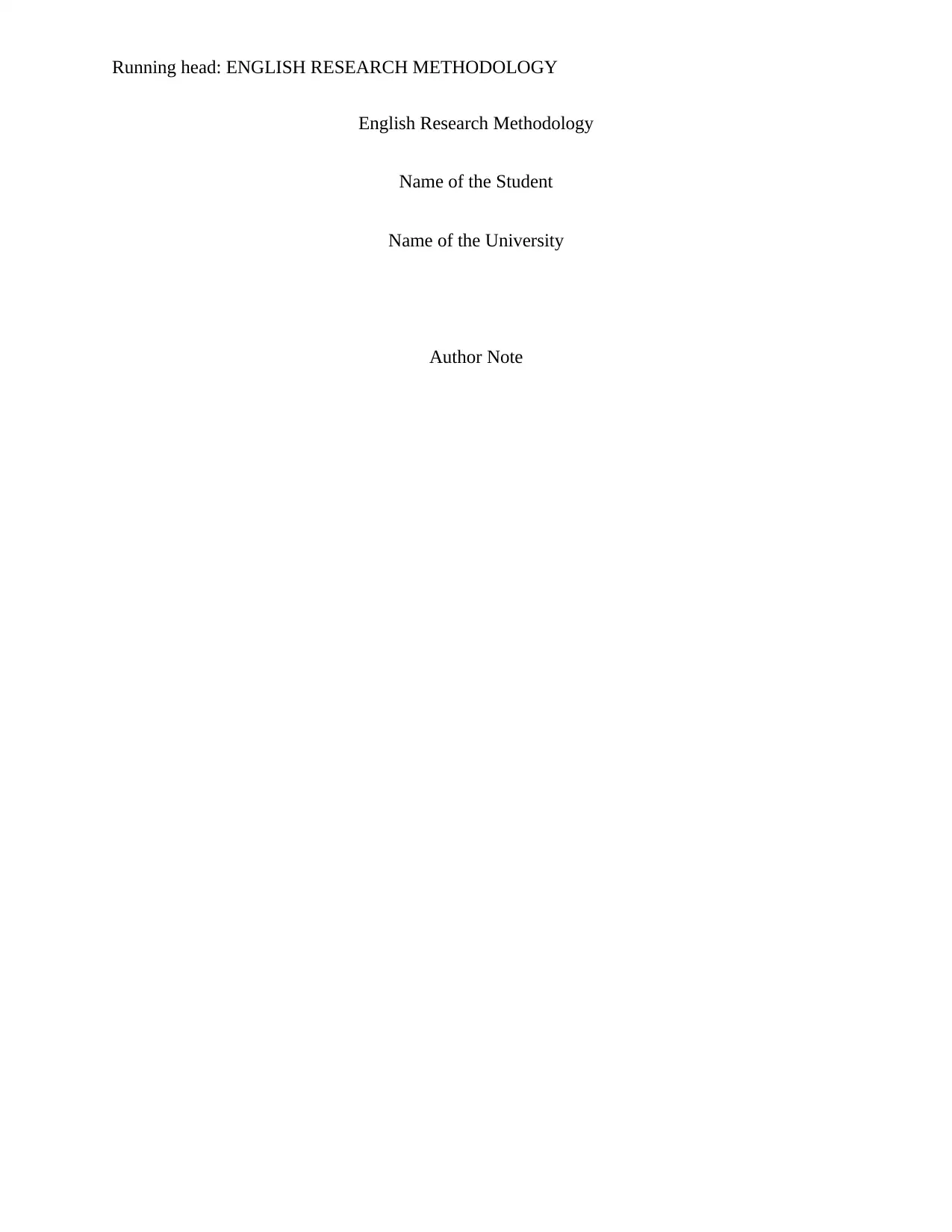
Running head: ENGLISH RESEARCH METHODOLOGY
English Research Methodology
Name of the Student
Name of the University
Author Note
English Research Methodology
Name of the Student
Name of the University
Author Note
Paraphrase This Document
Need a fresh take? Get an instant paraphrase of this document with our AI Paraphraser
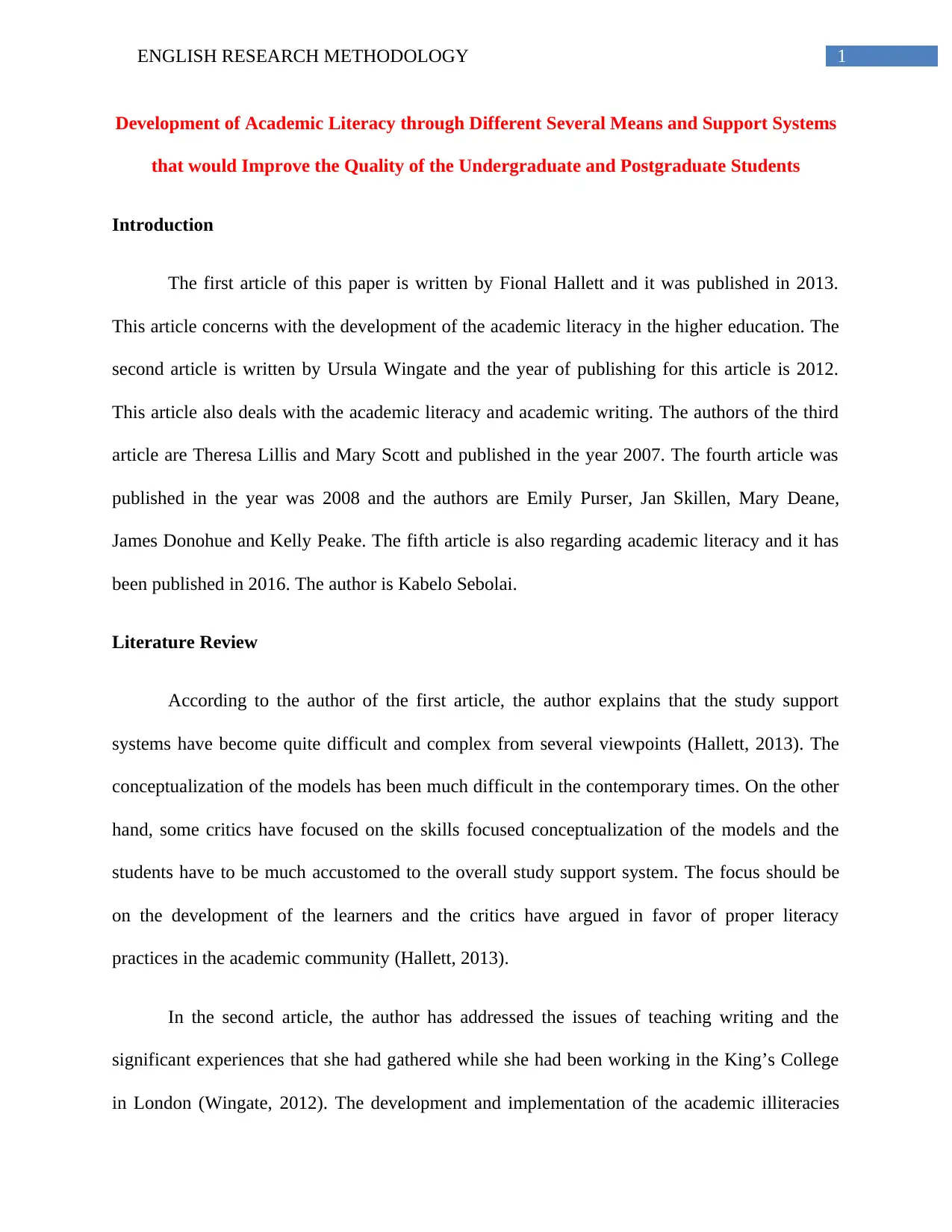
1ENGLISH RESEARCH METHODOLOGY
Development of Academic Literacy through Different Several Means and Support Systems
that would Improve the Quality of the Undergraduate and Postgraduate Students
Introduction
The first article of this paper is written by Fional Hallett and it was published in 2013.
This article concerns with the development of the academic literacy in the higher education. The
second article is written by Ursula Wingate and the year of publishing for this article is 2012.
This article also deals with the academic literacy and academic writing. The authors of the third
article are Theresa Lillis and Mary Scott and published in the year 2007. The fourth article was
published in the year was 2008 and the authors are Emily Purser, Jan Skillen, Mary Deane,
James Donohue and Kelly Peake. The fifth article is also regarding academic literacy and it has
been published in 2016. The author is Kabelo Sebolai.
Literature Review
According to the author of the first article, the author explains that the study support
systems have become quite difficult and complex from several viewpoints (Hallett, 2013). The
conceptualization of the models has been much difficult in the contemporary times. On the other
hand, some critics have focused on the skills focused conceptualization of the models and the
students have to be much accustomed to the overall study support system. The focus should be
on the development of the learners and the critics have argued in favor of proper literacy
practices in the academic community (Hallett, 2013).
In the second article, the author has addressed the issues of teaching writing and the
significant experiences that she had gathered while she had been working in the King’s College
in London (Wingate, 2012). The development and implementation of the academic illiteracies
Development of Academic Literacy through Different Several Means and Support Systems
that would Improve the Quality of the Undergraduate and Postgraduate Students
Introduction
The first article of this paper is written by Fional Hallett and it was published in 2013.
This article concerns with the development of the academic literacy in the higher education. The
second article is written by Ursula Wingate and the year of publishing for this article is 2012.
This article also deals with the academic literacy and academic writing. The authors of the third
article are Theresa Lillis and Mary Scott and published in the year 2007. The fourth article was
published in the year was 2008 and the authors are Emily Purser, Jan Skillen, Mary Deane,
James Donohue and Kelly Peake. The fifth article is also regarding academic literacy and it has
been published in 2016. The author is Kabelo Sebolai.
Literature Review
According to the author of the first article, the author explains that the study support
systems have become quite difficult and complex from several viewpoints (Hallett, 2013). The
conceptualization of the models has been much difficult in the contemporary times. On the other
hand, some critics have focused on the skills focused conceptualization of the models and the
students have to be much accustomed to the overall study support system. The focus should be
on the development of the learners and the critics have argued in favor of proper literacy
practices in the academic community (Hallett, 2013).
In the second article, the author has addressed the issues of teaching writing and the
significant experiences that she had gathered while she had been working in the King’s College
in London (Wingate, 2012). The development and implementation of the academic illiteracies
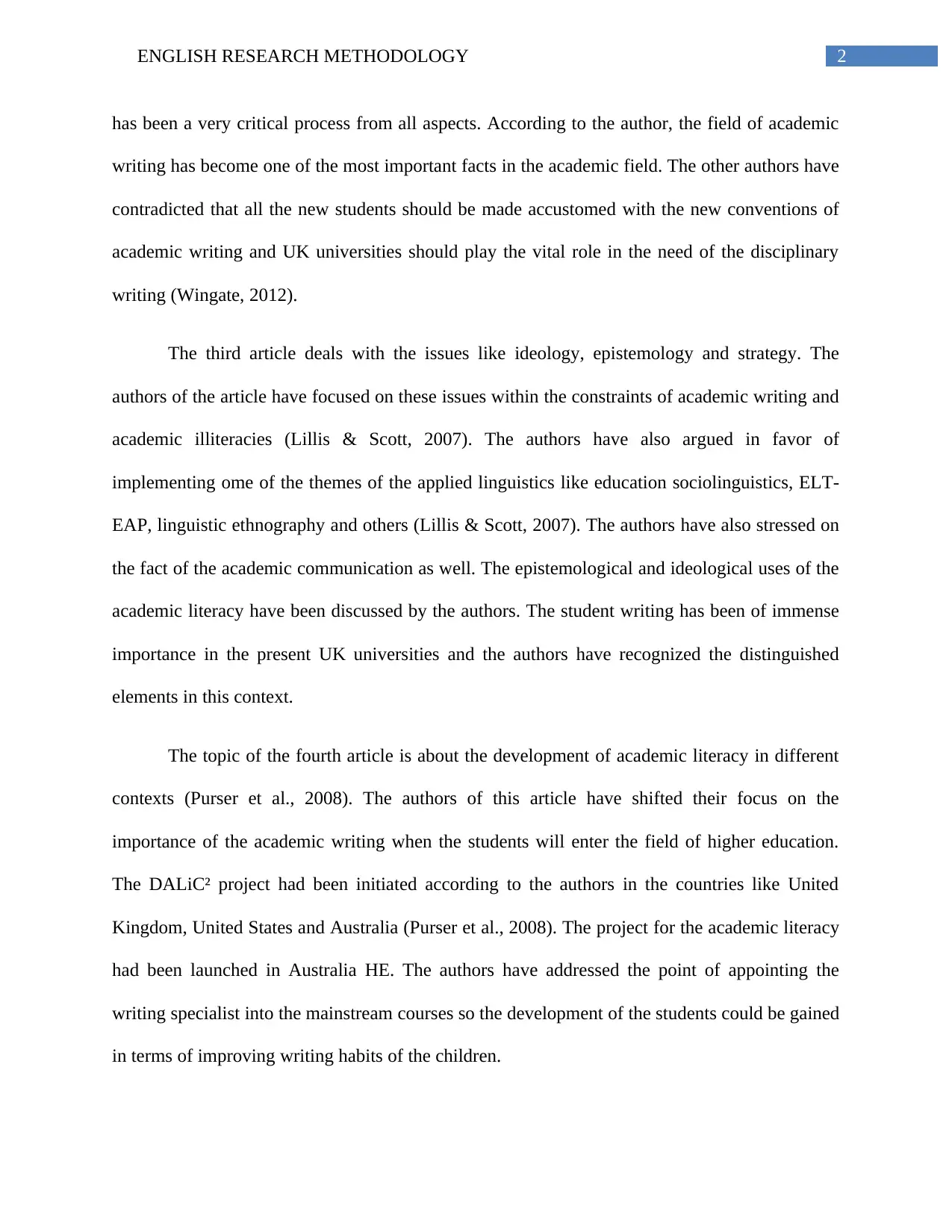
2ENGLISH RESEARCH METHODOLOGY
has been a very critical process from all aspects. According to the author, the field of academic
writing has become one of the most important facts in the academic field. The other authors have
contradicted that all the new students should be made accustomed with the new conventions of
academic writing and UK universities should play the vital role in the need of the disciplinary
writing (Wingate, 2012).
The third article deals with the issues like ideology, epistemology and strategy. The
authors of the article have focused on these issues within the constraints of academic writing and
academic illiteracies (Lillis & Scott, 2007). The authors have also argued in favor of
implementing ome of the themes of the applied linguistics like education sociolinguistics, ELT-
EAP, linguistic ethnography and others (Lillis & Scott, 2007). The authors have also stressed on
the fact of the academic communication as well. The epistemological and ideological uses of the
academic literacy have been discussed by the authors. The student writing has been of immense
importance in the present UK universities and the authors have recognized the distinguished
elements in this context.
The topic of the fourth article is about the development of academic literacy in different
contexts (Purser et al., 2008). The authors of this article have shifted their focus on the
importance of the academic writing when the students will enter the field of higher education.
The DALiC² project had been initiated according to the authors in the countries like United
Kingdom, United States and Australia (Purser et al., 2008). The project for the academic literacy
had been launched in Australia HE. The authors have addressed the point of appointing the
writing specialist into the mainstream courses so the development of the students could be gained
in terms of improving writing habits of the children.
has been a very critical process from all aspects. According to the author, the field of academic
writing has become one of the most important facts in the academic field. The other authors have
contradicted that all the new students should be made accustomed with the new conventions of
academic writing and UK universities should play the vital role in the need of the disciplinary
writing (Wingate, 2012).
The third article deals with the issues like ideology, epistemology and strategy. The
authors of the article have focused on these issues within the constraints of academic writing and
academic illiteracies (Lillis & Scott, 2007). The authors have also argued in favor of
implementing ome of the themes of the applied linguistics like education sociolinguistics, ELT-
EAP, linguistic ethnography and others (Lillis & Scott, 2007). The authors have also stressed on
the fact of the academic communication as well. The epistemological and ideological uses of the
academic literacy have been discussed by the authors. The student writing has been of immense
importance in the present UK universities and the authors have recognized the distinguished
elements in this context.
The topic of the fourth article is about the development of academic literacy in different
contexts (Purser et al., 2008). The authors of this article have shifted their focus on the
importance of the academic writing when the students will enter the field of higher education.
The DALiC² project had been initiated according to the authors in the countries like United
Kingdom, United States and Australia (Purser et al., 2008). The project for the academic literacy
had been launched in Australia HE. The authors have addressed the point of appointing the
writing specialist into the mainstream courses so the development of the students could be gained
in terms of improving writing habits of the children.
⊘ This is a preview!⊘
Do you want full access?
Subscribe today to unlock all pages.

Trusted by 1+ million students worldwide
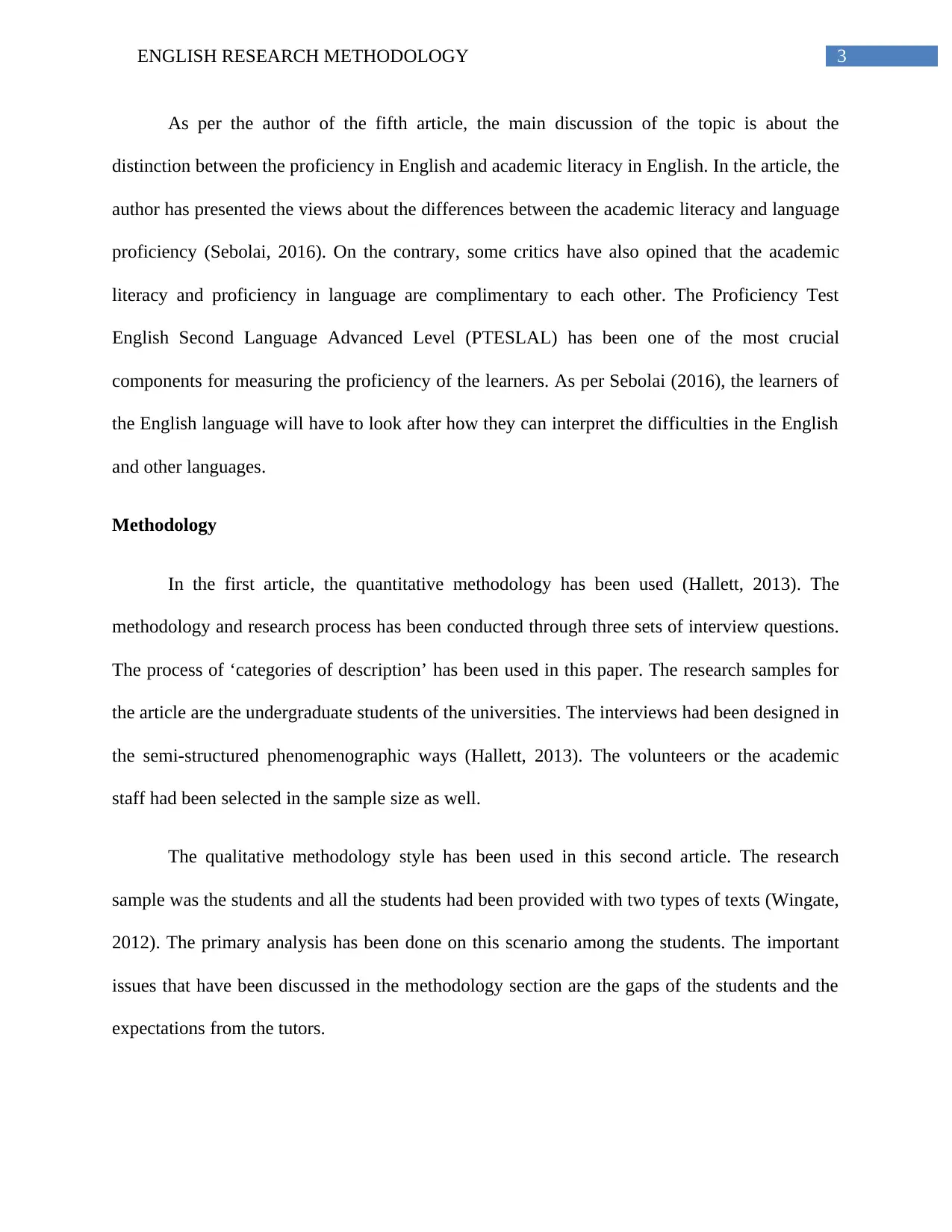
3ENGLISH RESEARCH METHODOLOGY
As per the author of the fifth article, the main discussion of the topic is about the
distinction between the proficiency in English and academic literacy in English. In the article, the
author has presented the views about the differences between the academic literacy and language
proficiency (Sebolai, 2016). On the contrary, some critics have also opined that the academic
literacy and proficiency in language are complimentary to each other. The Proficiency Test
English Second Language Advanced Level (PTESLAL) has been one of the most crucial
components for measuring the proficiency of the learners. As per Sebolai (2016), the learners of
the English language will have to look after how they can interpret the difficulties in the English
and other languages.
Methodology
In the first article, the quantitative methodology has been used (Hallett, 2013). The
methodology and research process has been conducted through three sets of interview questions.
The process of ‘categories of description’ has been used in this paper. The research samples for
the article are the undergraduate students of the universities. The interviews had been designed in
the semi-structured phenomenographic ways (Hallett, 2013). The volunteers or the academic
staff had been selected in the sample size as well.
The qualitative methodology style has been used in this second article. The research
sample was the students and all the students had been provided with two types of texts (Wingate,
2012). The primary analysis has been done on this scenario among the students. The important
issues that have been discussed in the methodology section are the gaps of the students and the
expectations from the tutors.
As per the author of the fifth article, the main discussion of the topic is about the
distinction between the proficiency in English and academic literacy in English. In the article, the
author has presented the views about the differences between the academic literacy and language
proficiency (Sebolai, 2016). On the contrary, some critics have also opined that the academic
literacy and proficiency in language are complimentary to each other. The Proficiency Test
English Second Language Advanced Level (PTESLAL) has been one of the most crucial
components for measuring the proficiency of the learners. As per Sebolai (2016), the learners of
the English language will have to look after how they can interpret the difficulties in the English
and other languages.
Methodology
In the first article, the quantitative methodology has been used (Hallett, 2013). The
methodology and research process has been conducted through three sets of interview questions.
The process of ‘categories of description’ has been used in this paper. The research samples for
the article are the undergraduate students of the universities. The interviews had been designed in
the semi-structured phenomenographic ways (Hallett, 2013). The volunteers or the academic
staff had been selected in the sample size as well.
The qualitative methodology style has been used in this second article. The research
sample was the students and all the students had been provided with two types of texts (Wingate,
2012). The primary analysis has been done on this scenario among the students. The important
issues that have been discussed in the methodology section are the gaps of the students and the
expectations from the tutors.
Paraphrase This Document
Need a fresh take? Get an instant paraphrase of this document with our AI Paraphraser
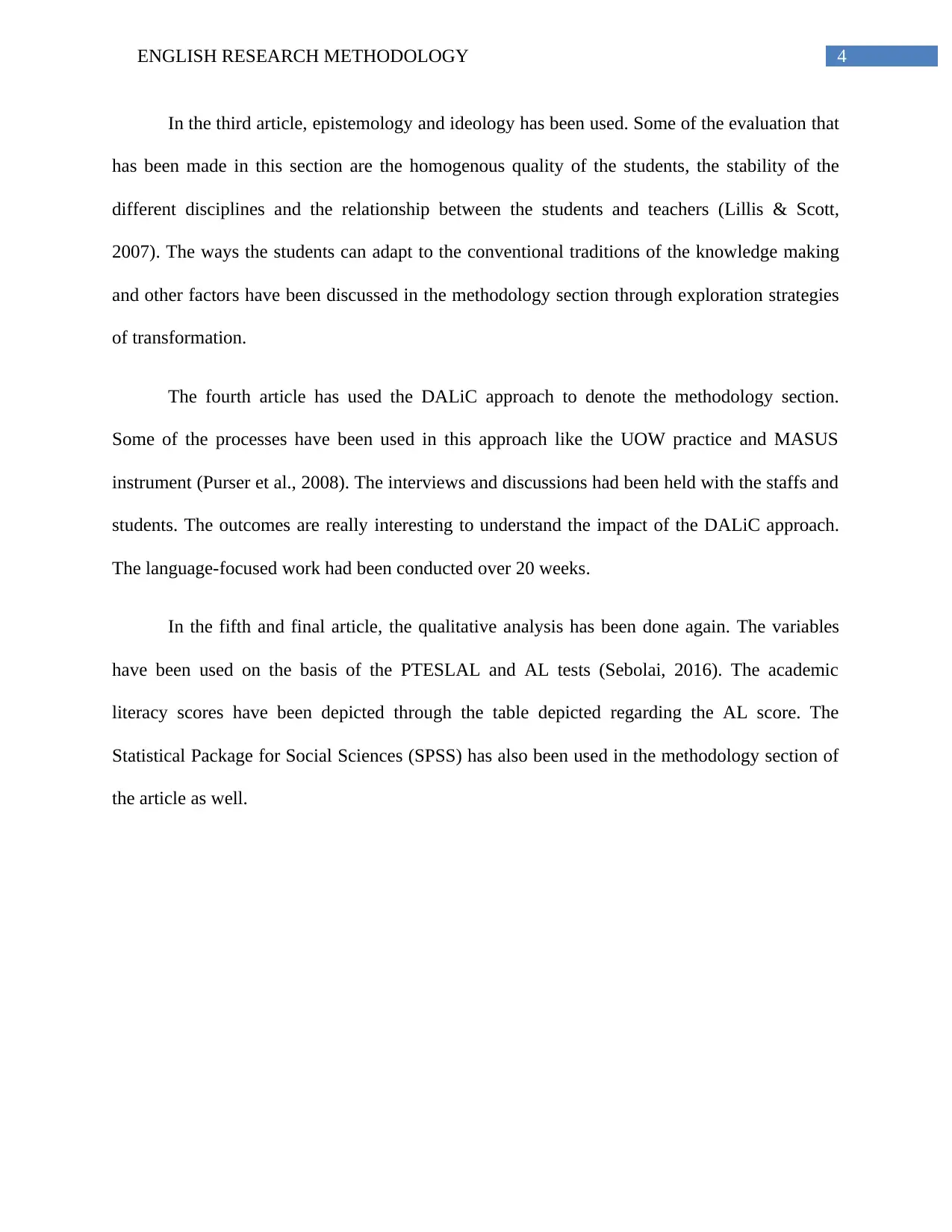
4ENGLISH RESEARCH METHODOLOGY
In the third article, epistemology and ideology has been used. Some of the evaluation that
has been made in this section are the homogenous quality of the students, the stability of the
different disciplines and the relationship between the students and teachers (Lillis & Scott,
2007). The ways the students can adapt to the conventional traditions of the knowledge making
and other factors have been discussed in the methodology section through exploration strategies
of transformation.
The fourth article has used the DALiC approach to denote the methodology section.
Some of the processes have been used in this approach like the UOW practice and MASUS
instrument (Purser et al., 2008). The interviews and discussions had been held with the staffs and
students. The outcomes are really interesting to understand the impact of the DALiC approach.
The language-focused work had been conducted over 20 weeks.
In the fifth and final article, the qualitative analysis has been done again. The variables
have been used on the basis of the PTESLAL and AL tests (Sebolai, 2016). The academic
literacy scores have been depicted through the table depicted regarding the AL score. The
Statistical Package for Social Sciences (SPSS) has also been used in the methodology section of
the article as well.
In the third article, epistemology and ideology has been used. Some of the evaluation that
has been made in this section are the homogenous quality of the students, the stability of the
different disciplines and the relationship between the students and teachers (Lillis & Scott,
2007). The ways the students can adapt to the conventional traditions of the knowledge making
and other factors have been discussed in the methodology section through exploration strategies
of transformation.
The fourth article has used the DALiC approach to denote the methodology section.
Some of the processes have been used in this approach like the UOW practice and MASUS
instrument (Purser et al., 2008). The interviews and discussions had been held with the staffs and
students. The outcomes are really interesting to understand the impact of the DALiC approach.
The language-focused work had been conducted over 20 weeks.
In the fifth and final article, the qualitative analysis has been done again. The variables
have been used on the basis of the PTESLAL and AL tests (Sebolai, 2016). The academic
literacy scores have been depicted through the table depicted regarding the AL score. The
Statistical Package for Social Sciences (SPSS) has also been used in the methodology section of
the article as well.
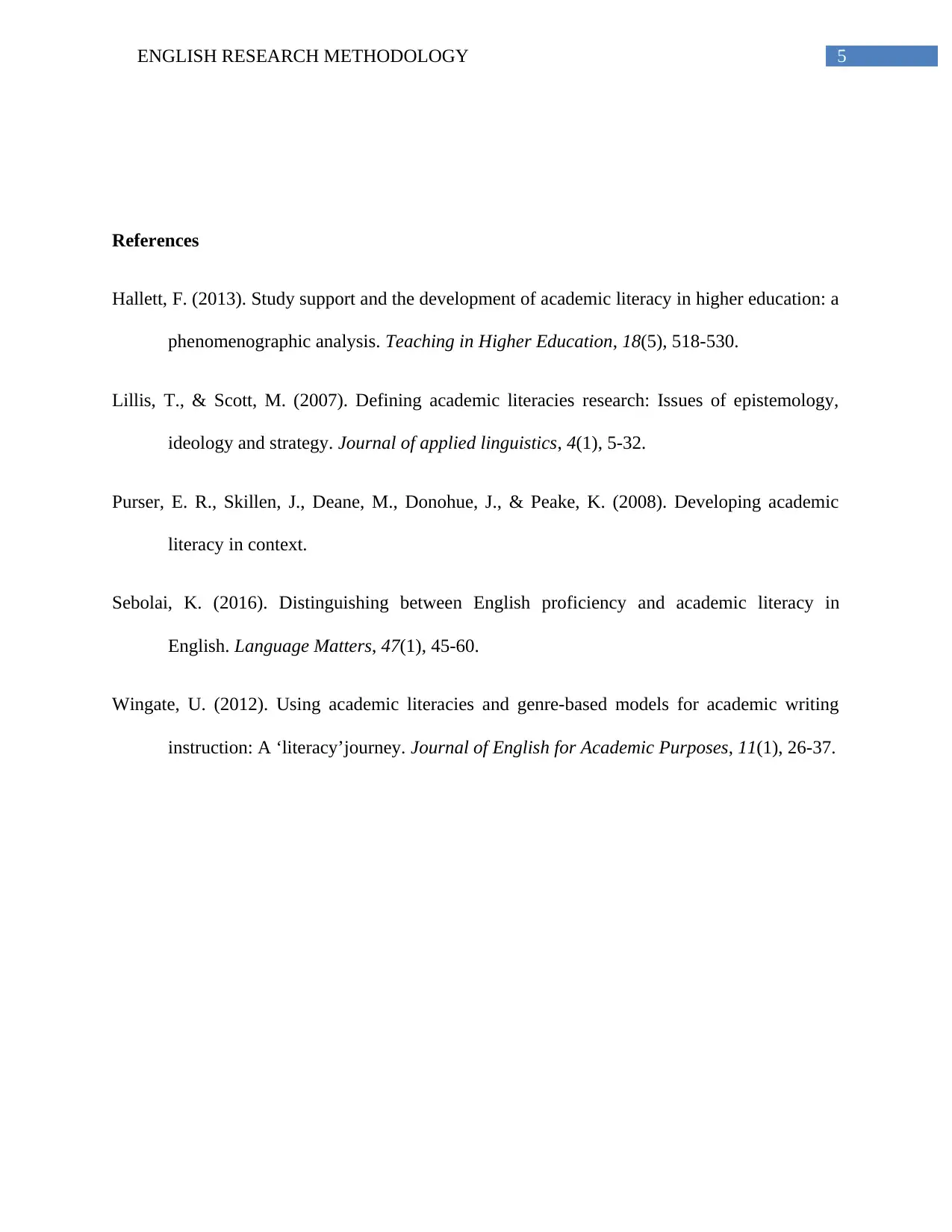
5ENGLISH RESEARCH METHODOLOGY
References
Hallett, F. (2013). Study support and the development of academic literacy in higher education: a
phenomenographic analysis. Teaching in Higher Education, 18(5), 518-530.
Lillis, T., & Scott, M. (2007). Defining academic literacies research: Issues of epistemology,
ideology and strategy. Journal of applied linguistics, 4(1), 5-32.
Purser, E. R., Skillen, J., Deane, M., Donohue, J., & Peake, K. (2008). Developing academic
literacy in context.
Sebolai, K. (2016). Distinguishing between English proficiency and academic literacy in
English. Language Matters, 47(1), 45-60.
Wingate, U. (2012). Using academic literacies and genre-based models for academic writing
instruction: A ‘literacy’journey. Journal of English for Academic Purposes, 11(1), 26-37.
References
Hallett, F. (2013). Study support and the development of academic literacy in higher education: a
phenomenographic analysis. Teaching in Higher Education, 18(5), 518-530.
Lillis, T., & Scott, M. (2007). Defining academic literacies research: Issues of epistemology,
ideology and strategy. Journal of applied linguistics, 4(1), 5-32.
Purser, E. R., Skillen, J., Deane, M., Donohue, J., & Peake, K. (2008). Developing academic
literacy in context.
Sebolai, K. (2016). Distinguishing between English proficiency and academic literacy in
English. Language Matters, 47(1), 45-60.
Wingate, U. (2012). Using academic literacies and genre-based models for academic writing
instruction: A ‘literacy’journey. Journal of English for Academic Purposes, 11(1), 26-37.
⊘ This is a preview!⊘
Do you want full access?
Subscribe today to unlock all pages.

Trusted by 1+ million students worldwide
1 out of 6
Your All-in-One AI-Powered Toolkit for Academic Success.
+13062052269
info@desklib.com
Available 24*7 on WhatsApp / Email
![[object Object]](/_next/static/media/star-bottom.7253800d.svg)
Unlock your academic potential
Copyright © 2020–2026 A2Z Services. All Rights Reserved. Developed and managed by ZUCOL.